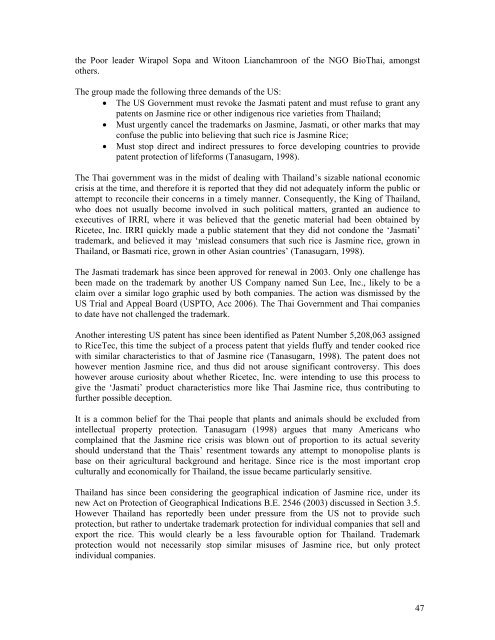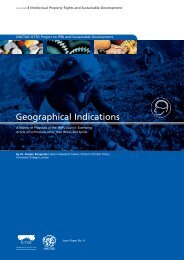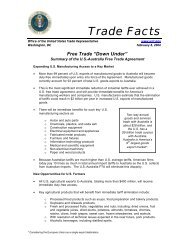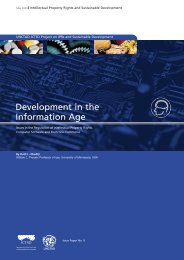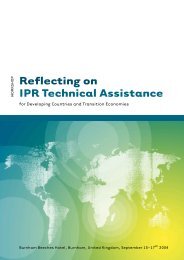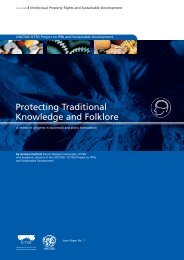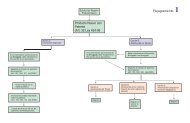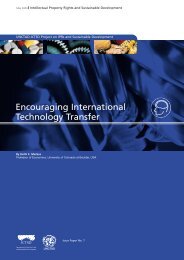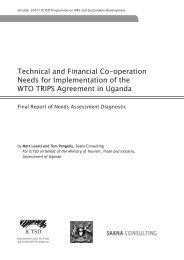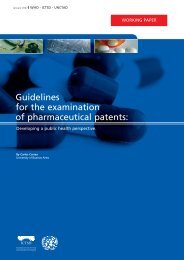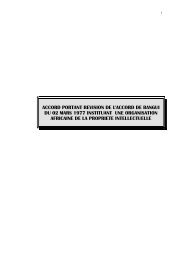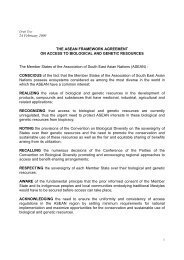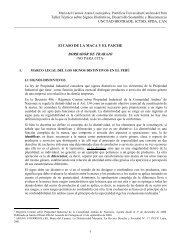Governance and Micropolitics of Traditional ... - IPRsonline.org
Governance and Micropolitics of Traditional ... - IPRsonline.org
Governance and Micropolitics of Traditional ... - IPRsonline.org
You also want an ePaper? Increase the reach of your titles
YUMPU automatically turns print PDFs into web optimized ePapers that Google loves.
the Poor leader Wirapol Sopa <strong>and</strong> Witoon Lianchamroon <strong>of</strong> the NGO BioThai, amongst<br />
others.<br />
The group made the following three dem<strong>and</strong>s <strong>of</strong> the US:<br />
• The US Government must revoke the Jasmati patent <strong>and</strong> must refuse to grant any<br />
patents on Jasmine rice or other indigenous rice varieties from Thail<strong>and</strong>;<br />
• Must urgently cancel the trademarks on Jasmine, Jasmati, or other marks that may<br />
confuse the public into believing that such rice is Jasmine Rice;<br />
• Must stop direct <strong>and</strong> indirect pressures to force developing countries to provide<br />
patent protection <strong>of</strong> lifeforms (Tanasugarn, 1998).<br />
The Thai government was in the midst <strong>of</strong> dealing with Thail<strong>and</strong>’s sizable national economic<br />
crisis at the time, <strong>and</strong> therefore it is reported that they did not adequately inform the public or<br />
attempt to reconcile their concerns in a timely manner. Consequently, the King <strong>of</strong> Thail<strong>and</strong>,<br />
who does not usually become involved in such political matters, granted an audience to<br />
executives <strong>of</strong> IRRI, where it was believed that the genetic material had been obtained by<br />
Ricetec, Inc. IRRI quickly made a public statement that they did not condone the ‘Jasmati’<br />
trademark, <strong>and</strong> believed it may ‘mislead consumers that such rice is Jasmine rice, grown in<br />
Thail<strong>and</strong>, or Basmati rice, grown in other Asian countries’ (Tanasugarn, 1998).<br />
The Jasmati trademark has since been approved for renewal in 2003. Only one challenge has<br />
been made on the trademark by another US Company named Sun Lee, Inc., likely to be a<br />
claim over a similar logo graphic used by both companies. The action was dismissed by the<br />
US Trial <strong>and</strong> Appeal Board (USPTO, Acc 2006). The Thai Government <strong>and</strong> Thai companies<br />
to date have not challenged the trademark.<br />
Another interesting US patent has since been identified as Patent Number 5,208,063 assigned<br />
to RiceTec, this time the subject <strong>of</strong> a process patent that yields fluffy <strong>and</strong> tender cooked rice<br />
with similar characteristics to that <strong>of</strong> Jasmine rice (Tanasugarn, 1998). The patent does not<br />
however mention Jasmine rice, <strong>and</strong> thus did not arouse significant controversy. This does<br />
however arouse curiosity about whether Ricetec, Inc. were intending to use this process to<br />
give the ‘Jasmati’ product characteristics more like Thai Jasmine rice, thus contributing to<br />
further possible deception.<br />
It is a common belief for the Thai people that plants <strong>and</strong> animals should be excluded from<br />
intellectual property protection. Tanasugarn (1998) argues that many Americans who<br />
complained that the Jasmine rice crisis was blown out <strong>of</strong> proportion to its actual severity<br />
should underst<strong>and</strong> that the Thais’ resentment towards any attempt to monopolise plants is<br />
base on their agricultural background <strong>and</strong> heritage. Since rice is the most important crop<br />
culturally <strong>and</strong> economically for Thail<strong>and</strong>, the issue became particularly sensitive.<br />
Thail<strong>and</strong> has since been considering the geographical indication <strong>of</strong> Jasmine rice, under its<br />
new Act on Protection <strong>of</strong> Geographical Indications B.E. 2546 (2003) discussed in Section 3.5.<br />
However Thail<strong>and</strong> has reportedly been under pressure from the US not to provide such<br />
protection, but rather to undertake trademark protection for individual companies that sell <strong>and</strong><br />
export the rice. This would clearly be a less favourable option for Thail<strong>and</strong>. Trademark<br />
protection would not necessarily stop similar misuses <strong>of</strong> Jasmine rice, but only protect<br />
individual companies.<br />
47


